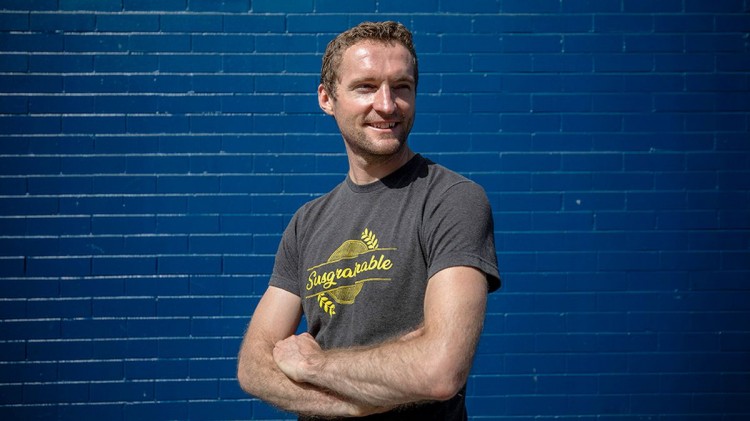
UBC Sauder School of Business grad tastes success turning spent grain into baked goods

Canada’s growing thirst for craft beer has created a curious challenge for microbrewers – finding a way to get rid of the spent grain, the malt that is leftover after the brewing process. It makes up about 85 per cent of a brewery’s by-product. While some is composted or sold for livestock, the supply is outpacing the demand, requiring brewers to pay for disposal.
Marc Wandler, a 34-year-old entrepreneur based in Vancouver, has come up with innovative solutions for how to capitalize on what many consider a waste product.
While enrolled in the UBC MBA program at the Robert H. Lee Graduate School, UBC Sauder School of Business, beginning in 2017, Wandler first learned from a colleague with a background in the beer industry that spent grain was a problem for breweries.
“Some end up producing a ton of this stuff,” he says. “It’s often the last thing they think about when they start a brewery and then they’re left to figure out how to manage the spent grain. Most of the time it goes to pig feed and farmers as a waste product, but right now they’re paying to get rid of it.”
Convinced that there had to be better ways to handle spent grain than to throw it away, Wandler had the chance to evaluate options over a four-month period as part of a tech entrepreneurship class.
His background in health care inspired him to think about how spent grain could be upcycled and repurposed. While most of the sugar is extracted during the brewing process, the spent grain still had plenty of fibre and protein.
Once dried, it’s milled into flour that is low on the glycemic index – suitable for people with diabetes or metabolic disease. Wandler decided to try using it to make cookies and waffles – the results were delicious.
“We got some great feedback and realized there was potential there,” he recalls.

To explore its potential fully, Wandler partnered with two friends from outside of the MBA program, Angela Poole and Clinton Bishop, to form Susgrainable Health Foods Inc., in July 2018.
The trio set their sights on creating a line of products they could sell this summer. Wandler volunteered at a local farmers’ market to learn the whole ecosystem within it, recognizing that many grassroots food companies start there. The networking opportunities were abundant.
With the knowledge he gained from his time at UBC Sauder, he felt ready to move forward. He’s especially thankful for learning more about the financial aspects of running a company – something he felt he lacked coming into the program. He used that understanding to start catering small events and supplying a café with the baked treats made from spent grain.
Fueled by its early success, the company started baking on a larger scale and Wandler turned down other job offers to concentrate full-time on the young company, which now employs seven people.
Currently, he’s poised to expand, looking to open a Vancouver-based manufacturing facility to produce the flour on a larger scale, hopefully by summer 2020. He’s also eyeing Calgary and Toronto as future locations for expansion.
Wandler credits UBC Sauder with giving him the tools and inspiration he needed to launch a business devoted to raising awareness around issues like food waste, the opportunities around upcycling and the importance of creating a clean, healthy food supply chain with minimal ecological footprint.
During his initial investigation of business programs, Wandler spoke to a panel of alumni and says the UBC Sauder grads mentioned that each and every one of them had a career-altering shift they never would have expected.
He decided to take a few business classes in early 2015. “I was testing the waters to see if I liked what UBC Sauder had to offer he recalls. “One of the things that drew me to UBC Sauder was its strong focus on sustainability.”
Though he envisioned starting a business five or ten years down the road, the chance to take an idea to make flour out of spent grain was timely, as consumers are increasingly embracing the idea of sustainability.
“I would not have created Susgrainable without my MBA education,” he says. “My time at UBC Sauder was invaluable.”
Even after he completed his MBA and started Susgrainable, his education did not stop there, having later conferred with at least six of his former professors to discuss ideas and leverage their expertise.
“They’ve been an incredible support,” he says. “One of the benefits of the program is the network you develop and the connections you build with the faculty. It’s a very collegial atmosphere.”
Wandler has no regrets about the choices he has made. His education gave him the opportunity to innovate and run with his idea for how to turn spent grain – a plentiful waste product that breweries struggled to get rid of – into something nutritious and delicious.
“Completing my MBA has definitely been rewarding,” he says. “It was worth it when you look at how it changed my life.”
For more information on the UBC MBA, visit sauder.ubc.ca/ftmba
First published by the Globe Content Studio